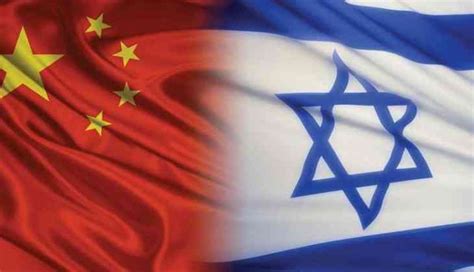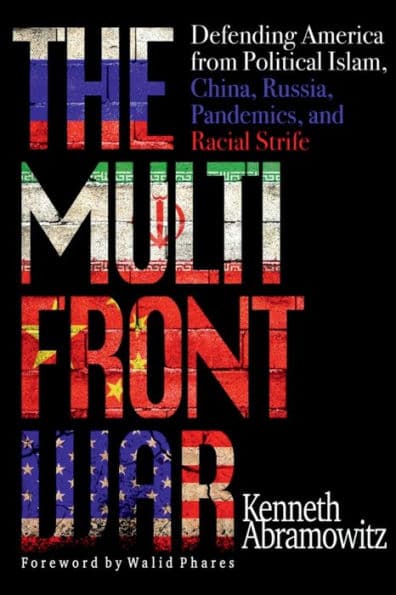.
By Rachel Avraham
According to various foreign media reports, the State of Israel recently cracked down upon at least 20 Israeli arms dealers, who were going to sell drones to China. This action was taken mainly because the Jewish state was concerned that the diplomatic cost to Israel’s relationship with the United States would be too difficult to bear. It comes after the Jewish state refused an American request to inspect Israel’s newly built Haifa port, which was constructed by a Chinese company, who was given lease to the port for the next 25 years.
Following this development, MK Ayoob Kara (Likud) proclaimed: “If the United States does not continue to recognize Israel’s sovereignty in the Golan Heights and drastically changes Trump’s Iran policy, Israel will have to consider building a stronger relationship with Russia and China. Till now, Israel has always considered American interests in relations to Russia and China. In the past, we even cancelled a major weapons deal with China to appease the United States.
“Yet if Biden reneges on America’s recognition of Israeli sovereignty over the Golan Heights and signs a nuclear deal with Iran, a deal that endangers the existence and the security of the State of Israel (as well as the U.S.), we must work to build stronger strategic ties to China and Russia, starting with the Haifa port deal,” he said.
Indeed, these reports indicate that while the United States considers China to be its number one strategic threat, the State of Israel does not and only takes action against China under heavy American pressure.
A recent report in Israel’s Institute for National Security Studies, which frequently voices official Israeli government positions, noted, “Israel is not the United States and is not in the Great Powers league. China is not threatening to push it aside from its global standing nor is it high on China’s strategic priorities. Israel is far away from East Asia and from the Western Pacific, the main theaters of military competition between the Great Powers. The Chinese military is not a threat to Israel, although Israel is affected by Chinese arms exports to the region.
“Ideological considerations rarely play a central role in Israeli foreign policy, which is pragmatic in its essence. More general, this is not the first issue in which the interests of Israel and its great ally do not fully overlap. That’s the way it is with friends.
“Israel sees China as an important trading partner, and rightly so,” the report added. “China’s capital, its markets, its manufacturing capacity, and its infrastructure building capabilities are significant contributors to the Israeli economy, and these Chinese assets are expected to grow. Over the past decade Israel has successfully identified this potential as an opportunity and has acted to maximize it, but Israel tends to identify the risk element of its relations with China mostly with the U.S. response to these relations.
“There is not enough emphasis on risk management in the government’s resolutions on the issue, and even the belated and moderate decision to improve foreign investments oversight in Israel was advanced under pressure from Washington.”
Indeed, the Chinese Israeli bilateral relationship has improved dramatically in recent years, with Confucius Institutes existing at Tel Aviv University and the Hebrew University of Jerusalem, with a Chinese Cultural Center operating out of a Tel Aviv skyrise. While many American universities are shutting down Confucius Institutes, the Israelis do not see a reason to follow suit, for they seek to stay neutral regarding America’s confrontation against China.
As Foreign Policy Magazine noted, “China is investing hundreds of millions of dollars per year in the Israeli tech sector, despite the previous Trump administration’s months-long charm offensive to persuade Israel to pull away.”
In the framework of the Belt and Road Initiative, China seeks to have strong relations with the 65 plus nations along the historic Silk Road, as a matter of policy. This naturally also includes the State of Israel. As Wan Tiunji, who heads the Chinese Cultural Center in Tel Aviv, noted, “With the growing relations between the two countries, the cultural field is also developing extremely fast. I think this cultural center is a milestone for the relations between the two countries.”
The center was established in celebration of the 25-year-anniversary of the establishment of diplomatic relations between Israel and China.
Already, the Israeli people generally have more positive than negative encounters with China and its people. Historically, there has never been any conflict between these two ancient nations. In the past, Jews traded along the Ancient Silk Road and China was a haven for Jews fleeing from the Holocaust. Ho Fen Shang, who served as the Chinese Consul General in Vienna during World War II, is believed to have saved tens of thousands of Jewish lives during the Holocaust.
In addition, both Israel and China share the values of having a long ancient history and of greatly valuing intellectual achievements. Given the lack of a hostile history, Israelis and Chinese have an even greater potential for mutually beneficial cooperation.
According to a 2018 public opinion poll that was conducted by SIGNAL, an organization working to advance diplomatic relations between Israel and China, “Overall, a majority consider Israel relatively important to China and vice versa. Sino-Israel relations are perceived as friendly by 100 percent of Israelis who had visited China, and more than 70 percent of those who had not. Sixty percent of respondents think that China plays a positive role in international relations.” In contrast, a 2017 Pew Opinion Poll found that 65% of Americans considered China to be either an adversary or a serious problem.
In a recent webinar conducted by JINSA, Assaf Orion, who heads the Israel-China Research Program at the Institute for National Security Studies, claimed that America’s perception of Chinese Israeli relations and how it could undermine Israeli American relations is the “greatest threat” China poses to the State of Israel. In addition, Orion was concerned about China’s relationship with Iran, although he added that China seeks to have a relationship with every state across the region and that he believes China views Israel to be a “more stable” partner than Iran.
So, how should the State of Israel respond? On the one hand, Israel has shared values with China. We are both ancient nations, who greatly value education. For the Chinese, this is an important value. Former Chinese Ambassador Zhao Jun stressed, “The friendship between Israel and the Chinese people has been going on for over 1,000 years. We in China admire you and your Jewish mind, which has brought many Nobel prizes. We admire you for creating miracles.”
Furthermore, anti-Semitism is not widespread in Chinese society. Yizhak Shichor of Haifa University’s Department of Asian Studies asserted, “Whatever anti-Semitism there is in Asia, it is superficial and rootless.” Similarly, Shalom Wald, a senior fellow at the Jewish People Policy Institute, claimed in his report titled China and the Jewish People: Old Civilizations in a New Era, “In all languages of the Christian and Muslim world, the word Jew carries heavy emotional and polemical baggage anchored in the founding texts of the two religions—the New Testament and the Quran. The Chinese do not carry this baggage.”
Nevertheless, the United States right now is very hostile to China and this makes it harder for Israel to pursue strong military relations with the Asian country, even though the country is a rising superpower that cannot be ignored. According to the INSS report, “It is likewise important to listen to the voices coming out of Washington. When the U.S. identifies China as its number one threat and describes the challenges it poses in terms of the greatest challenge of the generation and akin to the war against the Nazis, Israel’s maneuvering space in its relations with China can be expected to narrow, while American sensitivity to these relations will rise. Israel must not only steer clear of any harm to the vital interests of its strategic ally, but it should pay great attention to the mood in Washington, as befits relations with a close and loyal friend in a sensitive period.”
Further complicating this confusing situation is that the new Biden administration has as of yet to compile a comprehensive strategy that coordinates the numerous issues that define the American/Chinese bilateral conflict. As these policies become better defined, Israel will face the added challenge of zigging and zagging to suit its own interests, yet in a way that minimizes conflict with both the U.S. and China.
SOURCES:
China is the number one national security threat to the USA and to Israel? – inss.org
Israeli private arms expo is too terrible even for Tel Aviv – middleeasteye.net
Israel rejects US plan to inspect Chinese harbor – breakingdefense.com
Kara to Biden: Do not change Trump’s Golan Heights and Iran policy – peacecom.org
Influence without entanglement in the Middle East – foreignpolicy.com
Israeli perceptions of China – thediplomat.com
JINSA: Center of gravity is US perception of Israel’s China relations – jpost.com
China’s positive perception of Israel – unitedwithisrael.org
 Rachel Avraham is a political analyst working for the Safadi Center for International Diplomacy, Research, Public Relations and Human Rights, which is run by Mendi Safadi, a former Likud Candidate for the Knesset and a former chief of staff of former Israeli Communication Minister Ayoob Kara. Since 2012, she has been working as an Israel-based journalist and writer, covering Iran, Kurdistan, Turkey, Iraq, Syria, the Israeli-Palestinian conflict and other developments in the greater Islamic world.
Rachel Avraham is a political analyst working for the Safadi Center for International Diplomacy, Research, Public Relations and Human Rights, which is run by Mendi Safadi, a former Likud Candidate for the Knesset and a former chief of staff of former Israeli Communication Minister Ayoob Kara. Since 2012, she has been working as an Israel-based journalist and writer, covering Iran, Kurdistan, Turkey, Iraq, Syria, the Israeli-Palestinian conflict and other developments in the greater Islamic world.
Her articles have appeared in the Washington Times, the Hill, Front Page Magazine, the Daily Wire, the Christian Post, the Baltimore Jewish Times, the Jerusalem Post, Israel Hayom, Ahval and many other publications across the globe. She received her MA in Middle Eastern Studies from Ben-Gurion University. She got her BA in Government and Politics with minors in Jewish Studies and Middle Eastern Studies from the University of Maryland at College Park.
Ken`s new book The Multifront War is now available in 190 countries via Amazon and also on BNs in the US. Buy it now!
.
.






